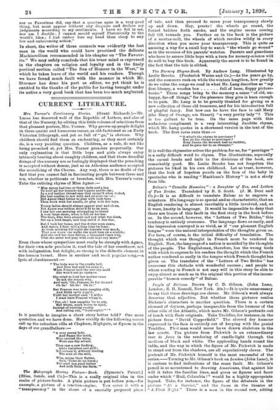CURRENT LITERATURE.
Mrs. Turner's Cautionary Stories. (Grant Richards.)—Mr. Lucas has deserved well of the Republic of Letters, and also of that of the Nursery, by editing this little volume of selections from that pleasant poetess, Mrs. Turner. Why grown-up people delight in these quaint and humorous verses, as old-fashioned as an Early Victorian lithograph, and yet so full of "go," is obvious. Why children should find them as enchanting, as they most certainly do, is a very puzzling question. Children, as a rule, do not like being preached at, yet Mrs. Turner preaches perpetually. Our only explanation is that little boys and girls always enjoy intensely hearing about naughty children, and that these dreadful doings of the nursery are so feelingly displayed that the preaching is accepted without demur, just as an Athenian audience accepted the moralising of the Chorus. Any way, there is no doubt of the fact that you cannot fail in fascinating people between three and ten, whether in petticoats or breeches, with Mrs. Turner's verse. Take the enticing rhyme of Miss Agnes :— " Miss Agnes bad two or three dolls and a box
To bold all her bonnets and tippets and trucks; In a red leather threed-case that snapp'd when it shut, She had needles to sew with and rci ssors to cut; But Agnes liked better to play with rude boys Than work with her needle, or play with her toys.
Young ladies should always appear neat and clean, Yet ARMS was seldom dresed fit to he seen. I saw her one morning attempting to throw A very large stone, when it fell on her toe: The boys, who were present and saw what was done, Set up a loud laugh, and they call'd it fine fun.
But I took her home, and the doctor soon came, And Agnes, I fear, will a long time be lame: As !rem morning till night she laments very mach, That now when she walks she must lean on a crutch; And she told her dear father, a thousand times o'er, That she never will play with rude boys any more."
Even those whose sympathies must really be strongly with Agnes, for their own acts proclaim it, read the tale of her overthrow, not with indignation, but delight, so strong is the didactic element in the human breast. Here is another and most popular song,—a lyric of chastisement :—
The babe was in the cradle laid, And Tom had said his prayer:, When Frances told the our-cry-maid She would not go upstairs.
She cried so loud her mother came To ask the reason why.
And said, 'Oh, Frances, fie for shame I Oh fie! Oh fie I Oh fie!'
But Frances was more naughty still, And Betty sadly nipp'd
Until her mother said. 'I will— I must have Frances whipp'd.
For, oh ! how naughty 'tis to cry, But worse, much worse to fight, Instead of running readily And calling out, "Good-night!"
Is it possible to imagine a short story better told ? One more quotation and we have done. How vividly do the following verses call up the suburban villa at Clapham, Highgate, or Epsom in the days of our grandfathers :-
"A very young lady. And Susan the maid, Who carried the baby, Were one day afraid.
They saw a cow feeding, Quite harmless and still : Yet scream'd, without heeding The man at the mill, Who, seeing their flutter, Said, 'flows do no harm; But send you good butter And milk from the farm."










































 Previous page
Previous page